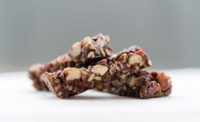In the not-too-distant past, it seemed like body builders looking to bulk up after the gym were the dominant consumers of the meal replacements/nutritional supplements category. The wellness trend is now mainstream. And with the increasing frequency of on-the-go lifestyles, many consumers are looking for convenient ways to get nutrients of a full, healthy meal without the hassle of cooking it. Enter the next generation of dairy-based meal replacement/nutritional supplement consumers.
According to Lindsey Ormond, director of nutrition and research at Eden Prairie, Minn.-based Milk Specialties Global, “While the ‘traditional’ body-building consumer still exists, the consumer group has widened significantly to include weekend warriors, endurance athletes, women and aging consumers.”
With this widening consumer base, the overall meal replacement/supplement category (dairy- and nondairy-based) is currently experiencing substantial growth. According to KD Market Insights, Albany, N.Y., the global nutritional supplement market is expected to expand at a compound annual growth rate of 10.01%, leading to a global revenue of $245.43 billion by 2023.
“The increasing consumer awareness for healthy living and healthy diet, increasing urbanization and changing lifestyles, prevention of diseases, awareness towards weight management among working professionals, development in the retail and pharmaceutical industries, innovation in product offerings [and] modernization of retail channels are some of the key factors that are driving the nutritional supplement market,” KD Market Insights reported.
Meal replacements are projected to have similar growth. The “Meal Replacement Products Market — Growth, Trends, and Forecast” report from Hyderabad, India-based Mordor Intelligence says that meal replacement products are expected to grow 7.1% during the forecast period of 2019-2024.
“The market is driven by factors such as busy lifestyles, rapid urbanization, rising health-consciousness and increasing demand for food convenience,” Mordor Intelligence said.
Packed with protein
Dairy-based products in the meal replacement/nutritional supplement category are benefiting from consumers’ seemingly insatiable search for more protein. Nutritional supplement and meal replacement creators are responding to this demand by adding more and more protein into their products. Dairy-based protein is a common choice.
“A wider appreciation and understanding of the benefit dietary protein has on health, weight management and wellbeing is fueling the supplements and meal replacements categories,” Ormond said.
Data confirm this story. According to the “Better for You Eating Trends — US, August 2018” report from global market research firm Mintel, 43% of consumers look at protein content when choosing food and beverages. For consumers of sports, nutrition and performance drinks, that number jumps to 53%.
However, with the desire for higher and higher protein content in meal replacements/nutritional supplements come the formulating difficulties of creating these types of products. Jeffery Bernstein, research scientist at Amco Proteins, Burlingon, N.J., said he has seen specific functional challenges that occur when fortifying products with additional protein.
“In frozen applications, proteins tend to crystalize with water and create [an] unpleasant crystalline texture not desired for applications like ice cream or sherbets,” he said. “In nutritional meal replacement bars, using the wrong protein can create hard, inedible bars and can even affect key shelf-life quality parameters like water activity.”
Amco Proteins developed ingredients to help processors solve these formulating problems. Its team of food scientists and engineers created a series of protein blends made of dairy proteins such as milk protein concentrate, whey protein concentrate, whey protein isolate and casein and protein hydrolysates. A recent creation, Bernstein said, is a functional blend called BakePLUS.
“BakePLUS protein blend solves major issues like overaeration in baking batters,” he added. “BakePLUS is over 80% protein by weight and is designed to achieve nutritional goals in baked goods by replacing the flour up to 20%. With a neutral flavor profile, this product is easy to develop into either sweet or savory baked goods that meet the indulgent desires of consumers.”
K.J. Burrington, dairy ingredient applications coordinator at the Center for Dairy Research (and a Dairy Foods columnist), also has seen formulating issues as processors try to create products with increasingly higher amounts of protein.
“Many companies are trying to get higher levels of protein per serving, i.e., over 30 grams in 10 [to] 12 ounces,” she said. “These levels are trickier to maintain stability throughout a 9 [to] 12-month shelf life without settling or gelling in an aseptically or retort-processed product.”
One way to avoid this formulation issue, Burrington said, is to make sure that dairy protein ingredients “are well hydrated and use buffers and hydrocolloids to try improve the protein stability over the shelf life.”
Plant-based proteins
For many consumers seeking to increase their protein intake through meal replacements/nutritional supplements, dairy protein is still king. But plant-based proteins are gaining traction. That’s a problem, Bernstein said, because unlike dairy proteins, individual plant proteins do not contain all nine essential amino acids.
“Consumer education on the differences in protein quality between different protein sources has started, but it needs to increase so consumers may make informed decisions when choosing what products to include in their diets,” she said, pointing to The Strong Inside campaign as an example of how the dairy industry can better educate shoppers. (The campaign, led by the American Dairy Products Institute, is an industrywide effort to inform consumers on the benefits of dairy proteins, the difference between various types of dairy proteins and the protein quality from a number of protein sources.)
Yet, plant-based products are constantly being developed in the meal replacement/nutritional supplement space. Huel, Los Angeles, recently began releasing its products in the United States. It focuses on plant-based meal replacements that fit into a busy lifestyle.
A new product release is the Huel Chocolate ready-to-drink beverage, which the company said is a perfectly balanced and nutritionally complete meal that can be prepared in under one minute. The product contains “all 27 essential vitamins and minerals” and is vegan, non-GMO and soy-free.
Beyond the label
As with every other category in the food and beverage world, meal replacements/nutritional supplements are finding ways to respond to clean-label demand from consumers, said Bernstein.
“Current consumer and retail trends in supplements and meal replacements focus on the following two things: simple ingredients and overall wellness,” he said. “More specifically, simple ingredients mean clean ingredients, or names that consumers recognize.”
Laurie Drake, senior brand manager, Organic Valley, La Farge, Wis., said many nutritional supplements/meal replacements contain long ingredient lists, which can be a turnoff for those looking for cleaned-up labels. Organic Valley recently reformulated its Organic Valley Fuel protein shakes to better align with consumer values. The new shakes contain 20 grams of protein and 10 grams of sugar or less.
“Organic Valley … has only seven or eight ingredients in our Fuel products compared to companies that have up to 16-plus ingredients in the milk protein shake space,” she said.
Meal replacements/nutritional supplements face added scrutiny due to the category’s reputation for providing specific kinds of nutrients/benefits. People want to know the sources and veracity of health claims on their labels.
“Consumers are increasingly concerned about the quality of the products they are purchasing, and the majority of those purchasing drinks across segments believe in the importance of researching drinks before buying,” Mintel said in its “Sports, Nutrition and Performance Drinks US, March 2019” report. “Moving forward, products that are able to proudly promote their ingredients and benefits are likely to have the strongest growth and broadest appeal.”
Potentially hurting some meal replacement/nutritional supplement creators is the perception that products are making false claims. According to KD Market Insights, this negative publicity surrounding fake product claims may hinder the growth of the market.
Billy Bosch, CEO and founder of Santa Monica, Calif.-based Iconic Protein, said transparency is key to gaining the trust of consumers who may be suspicious of meal replacement/nutritional supplements.
“Supplements are one of the most untrustworthy categories out there. Think about all the wild claims you’ve seen that are unsupported,” he added. “As transparency becomes more important to consumers, ingredient sourcing and supply chain will move to the forefront for brands, as will highlighting these components in marketing and packaging.”
Iconic Protein makes sure to communicate the sourcing of its protein drinks and protein powders. For example, its latest product release, Cacao + Greens, uses cacao grown sustainably in Peru and Grass Fed Verified dairy protein from grass-fed cows in Ireland.
“Iconic’s ingredients supplier regularly visits farmers, confirming firsthand that sustainable and fair trade farming practices are being used,” Bosch said.
The new product has “about the same amount of protein as three large eggs to fill you up, plus a boost of greens with the taste of chocolate milk,” Bosch said, and joins Iconic Protein’s line of six other protein drinks. The beverages, which are available in select Whole Foods Market and Target stores nationwide, also come in Vanilla Bean, Chocolate Truffle, Café Latte, Coconut Matcha and Tumeric Ginger flavors.
Some consumers also have a negative perception of the taste of meal replacements/nutritional supplements, said Gus Malliarodakis, CEO of FitPro USA LLC, Livermore, Calif. This can make it challenging to expand to new purchasers.
“The majority of the meal replacement products on the market are made with reconstituted powders and have a chalky taste and negative effect on the GI system,” he said. “Even though FitPro Go! is lactose-free and made with real milk, people often lump our delicious shake into the same category. This cuts way down on consumer trial.”
Malliarodakis said FitPro USA is dealing with this challenge by offering sampling programs of small multi-flavor offerings to get consumers to try its products at a minimal cost. The company is also enlisting social media influencers to get the word out.
Upgraded experience
So what does the future look like for the dairy-based meal replacement/nutritional supplement category? Bosch thinks that consumers will continue to look for even more functionality and added health benefits.
“Functional beverages are one of the fastest-growing categories, and that trend shows no signs of slowing down,” he said. “There is an expectation from food and beverages to serve more than one purpose.”
Consumers view healthy diets as more than just a component of overall wellness. Bernstein said there is an increasing understanding that dietary changes can serve as treatment for various illness.
“While protein-fortified meal replacements like beverages, bars and cookies continue to be used to help consumers self-manage their nutrition and weight, there’s been a rising use of dairy proteins as adjunct medical therapies in the management of serious conditions like sarcopenia, diabetes and even heart disease,” he added. “In fact, whey proteins have been of particular interest, especially in the management of diseases like diabetes, because of [their] ability to manage post-meal blood sugars and even prevent overeating by triggering the body’s release of satiety hormones.”
Malliarodakis said producers of meal replacements/nutritional supplements could also see growth by offering multi-faceted options packaged together for an improved consumer experience. He points to a glass of milk and a cookie sold together as a potential future creation in the category.
“We think the category will be more focused on healthy ‘snacks’ as opposed to full meals,” he said.








